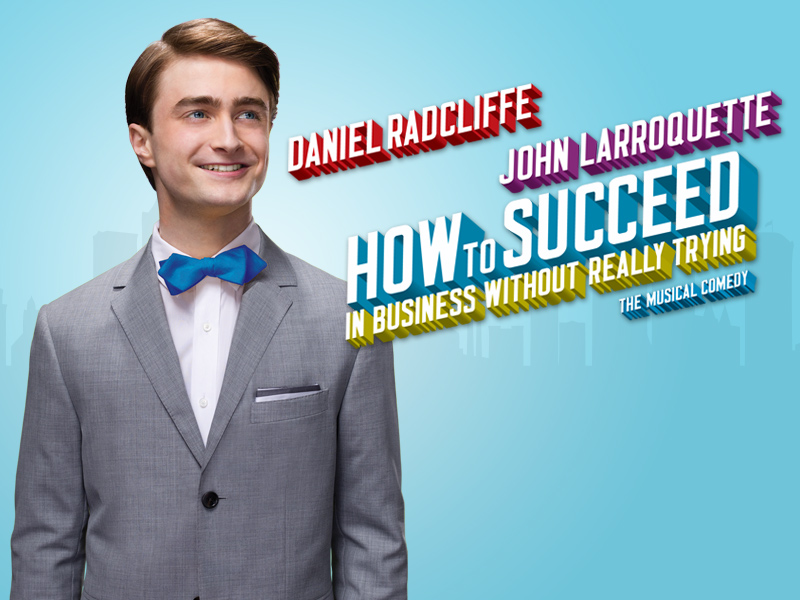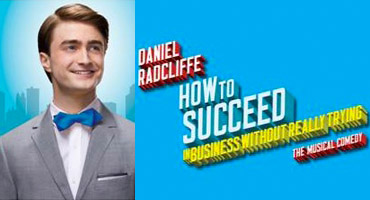How to Succeed in Business Without Really Trying originally opened in 1961 to across the board raves, a slew of Tony Awards and a rare Pulitzer win. A satire of corporate America, the show featured a book by Abe Burrows, Jack Weinstock and Willie Gilbert about an ambitious window-washer as he climbs the corporate ladder at the World Wide Wicket Company. The musical is based on an unlikely source: Sheperd Mead’s same-titled send-up of “How to” books published in 1952. The show was a mammoth success, running 1417 performances at the 46th Street Theatre and made Robert Morse a star. The musical also featured the last score from veteran composer Frank Loesser. The show is vibrant and funny, a clever send-up of social and gender mores of the Eisenhower era with an endearingly spry and morally unscrupulous hero. While the men connive and scheme their way to the top, the women connive and scheme to land a well-to-do husband – with all tongues firmly planted in cheek. The show is back on Broadway, this time at the Al Hirschfeld Theatre in a highly entertaining revival that is destined to make it a hit show once again.
When it was announced that Daniel Radcliffe would be starring in a 50th anniversary revival, I think most people were curious whether Harry Potter can sing and dance. And I am sure there are some who wondered if the young actor, who had never done either before could carry a show. And carry it he does with considerable energy and likability. The young star makes an instant connection with the audience and sings with a pleasant, if light, tenor. I’ve noticed some criticism about his singing but I have to counter that Finch was never written to be a singer’s role. Morse (original Broadway and film), Warren Berlinger (original London) and Matthew Broderick (1995 revival) were never noted for great singing either. It’s the character and how he’s played that counts especially with this show and Mr. Radcliffe is superb (and his American accent is exceptionally good). Oh, and he is also one hell of a dancer.
Co-starring with Radcliffe is five time Emmy winner John Larroquette making a smashing Broadway debut as J.B. Biggley. His singing is more of a bluster, but his comic creation works exceptionally well. Christopher J. Hanke was a more low-key nemesis than usual as Bud Frump, but not without some humorous moments (giving him the last cup of coffee in “Coffee Break” was inspired) but his singing voice sounded quite ragged. Robert Bartlett scores big in double duty roles as Mr. Twimble and Wally Womper. Michael Park offered stolid support as Mr. Bratt, who leads “A Secretary is Not a Toy” which contains one of my favorite theatre lyrics: “Her pad is to write in and not spend the night in.” CNN journalist Anderson Cooper makes a Broadway debut of sorts, voicing the unseen narrator (Walter Cronkite did the honor in 1995) but it doesn’t land as well as it could or should.
As for the ladies, Rose Hemingway makes her Broadway debut as Rosemary Pilkington, Finch’s love interest. Ms. Hemingway is pleasant but lacks that something extra special that sets Rosemary apart from the rest of the secretarial pool. Tammy Blanchard is an absolute riot – I think I laughed at every single line she delivered – stealing every one of her scenes as bombshell cigarette girl turned secretary Hedy LaRue. Mary Faber’s Smitty made for a charming sidekick. The fabulous Ellen Harvey as the no-nonsense, takes-no-guff Miss Jones skyrockets into the operatic stratosphere on the “Brotherhood of Man” counterpoint. I’d never heard of Ms. Harvey before last night’s performance, but now I’ll never forget her.
Director-choreographer Rob Ashford has created some memorable moments, particularly his new take on “Coffee Break” and the mammoth showstopper “Brotherhood of Man” (one of the most fool proof eleven o’clock numbers). He cleverly inverted the elevator-based “Been a Long Day” to amusing effect. An added football divertissement after “Grand Old Ivy” was amusing, but entirely superfluous. (Every time I’ve seen the show, this spoof of college fight songs has always proven a crowd favorite – it doesn’t really need help). I was at first worried, because he’s overdone the choreography for the opening number: too busy, too frenetic and unnecessary. But things improved almost immediately. As for tone, the satiric element was there but could have been taken up a notch. This is especially evident with the female characters and their act two opener ‘Cinderella, Darling” which director Des MacAnuff cut from the 1995 revival.
At intermission while waiting on what must have been the longest men’s room line in the history of the amenity, I noticed a great number of the other theater-goers were children. I saw teens and pre-teens almost every place I looked, no doubt brought in by Mr. Radcliffe’s affiliation with the Harry Potter films. (Then again, I can see How to Succeed as a better selling point than Equus). Much to my surprise and elation I noticed how much these kids were enjoying the production – and also how dapper they were all dressed – putting most of the adults in the house to stylistic shame. My slight reservations about the production aside, these kids are in for a real treat: a big old Broadway show executed with style and charm.
%CODE1%

